Abstract
The functional role of invariant chain in T-cell selection events and antigen presentation is well established. The invariant chain gene encodes differentially spliced isoforms, Ii31 and Ii41. The Ii41 isoform has been described to increase the efficiency of antigen presentation. We have analysed the effect of the Ii41 isoform on positive and negative selection of transgenic CD4 T cells with specificity for a natural self antigen (C5) which are crucially dependent on invariant chain for their development and functional antigen recognition. The data show that Ii41 fully substitutes for wild-type invariant chain in both positive and negative selection events during functional maturation of T cells with specificity for a natural, blood-borne self antigen.
Full text
PDF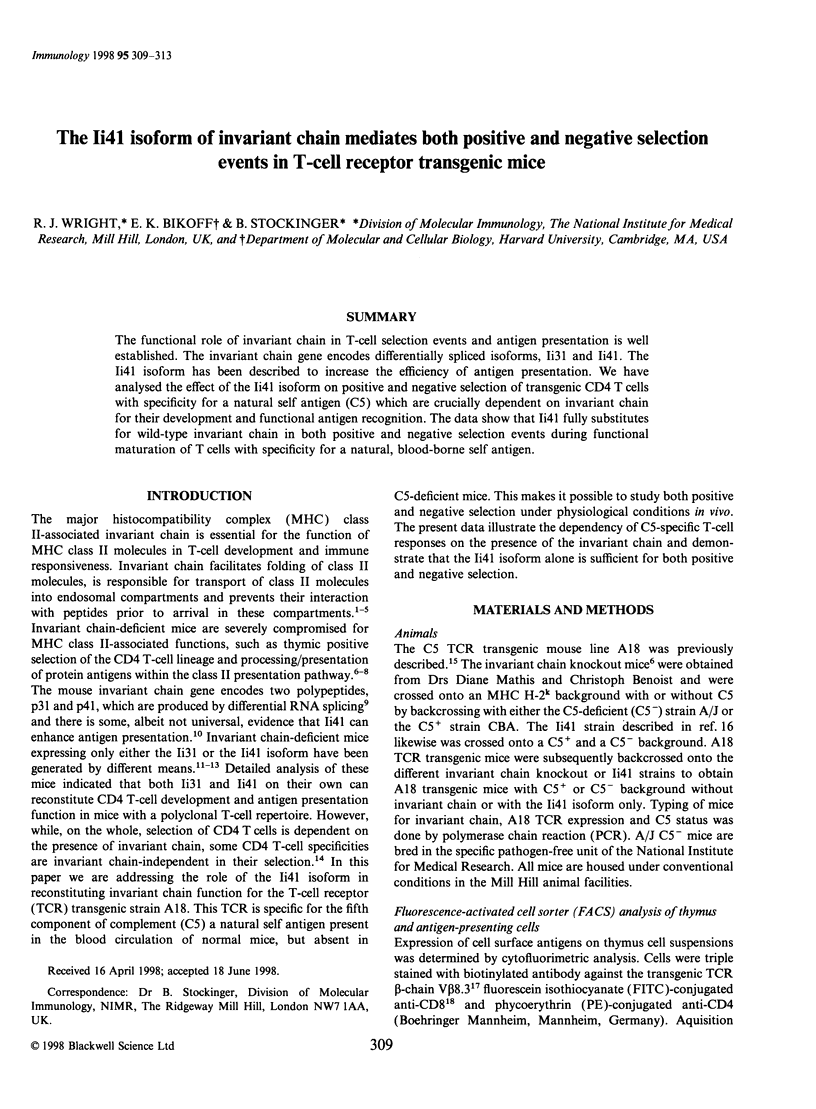
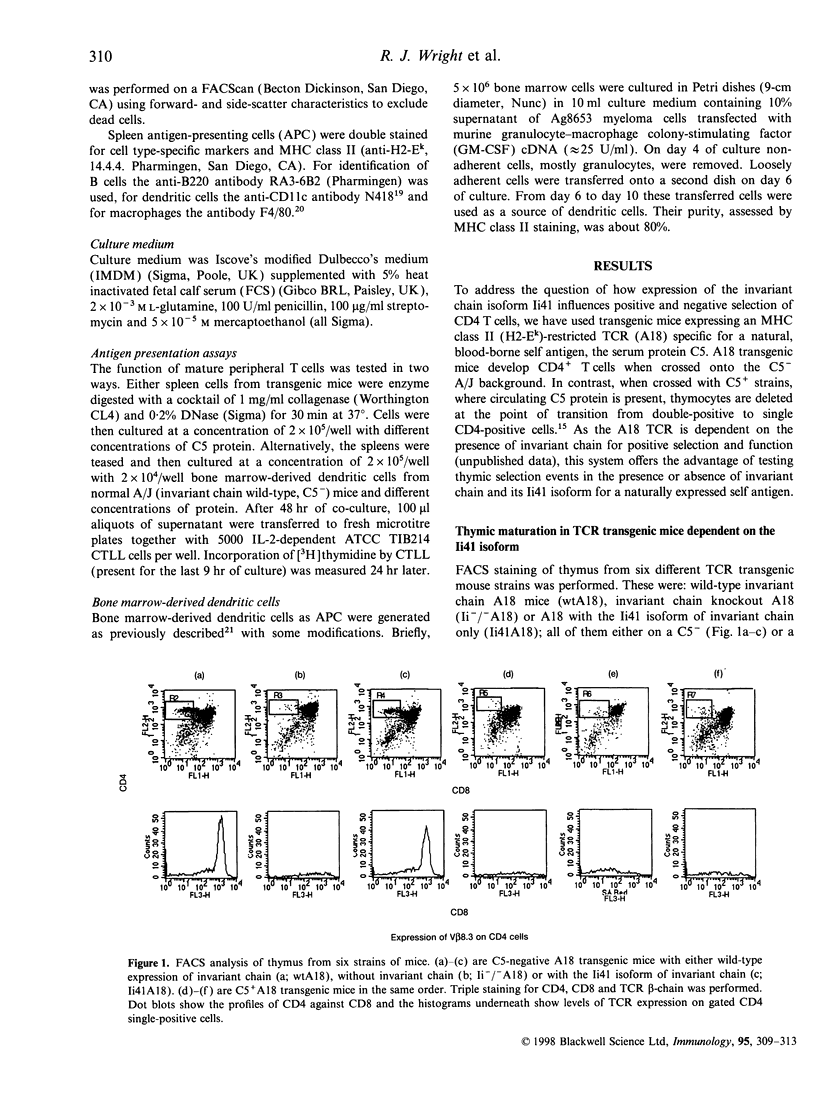
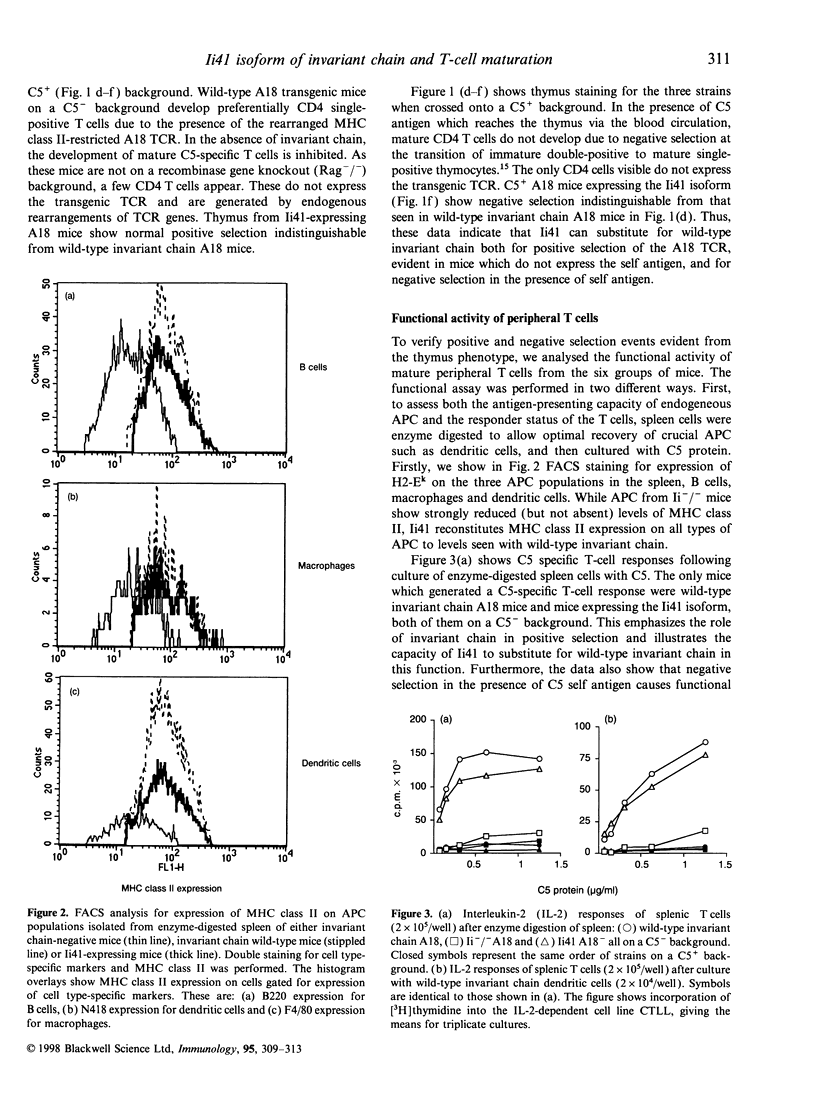
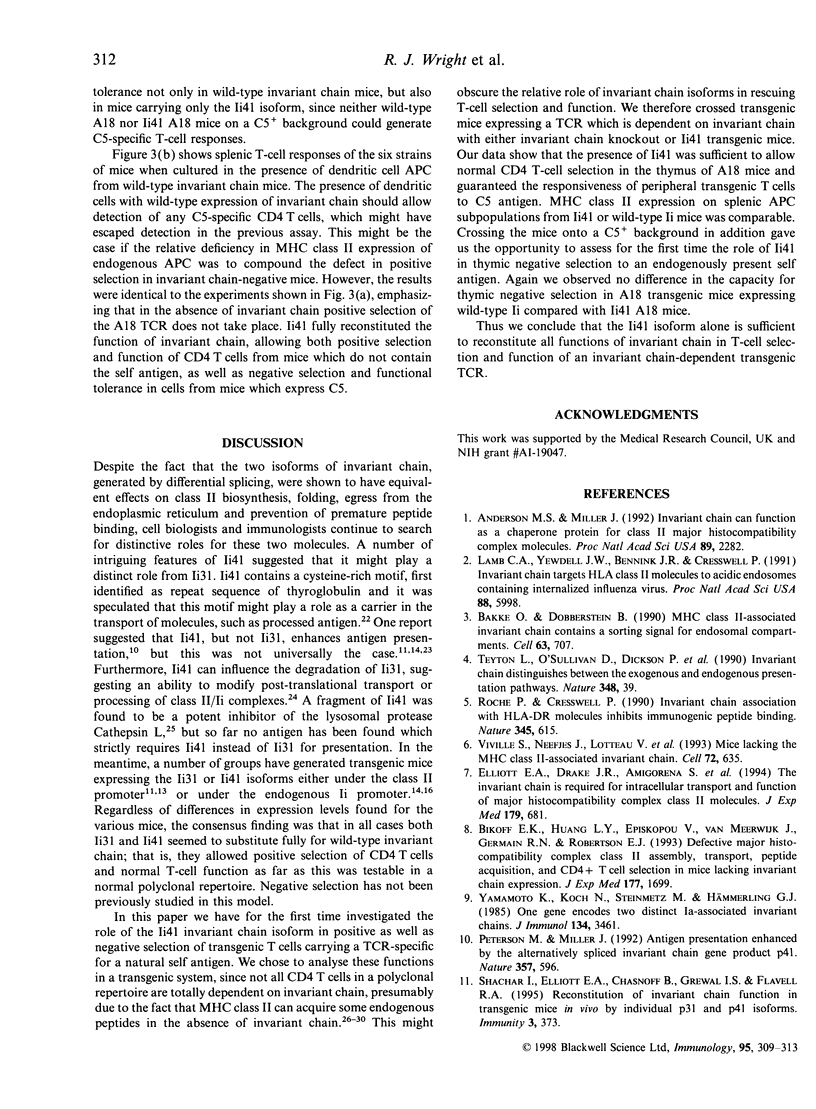
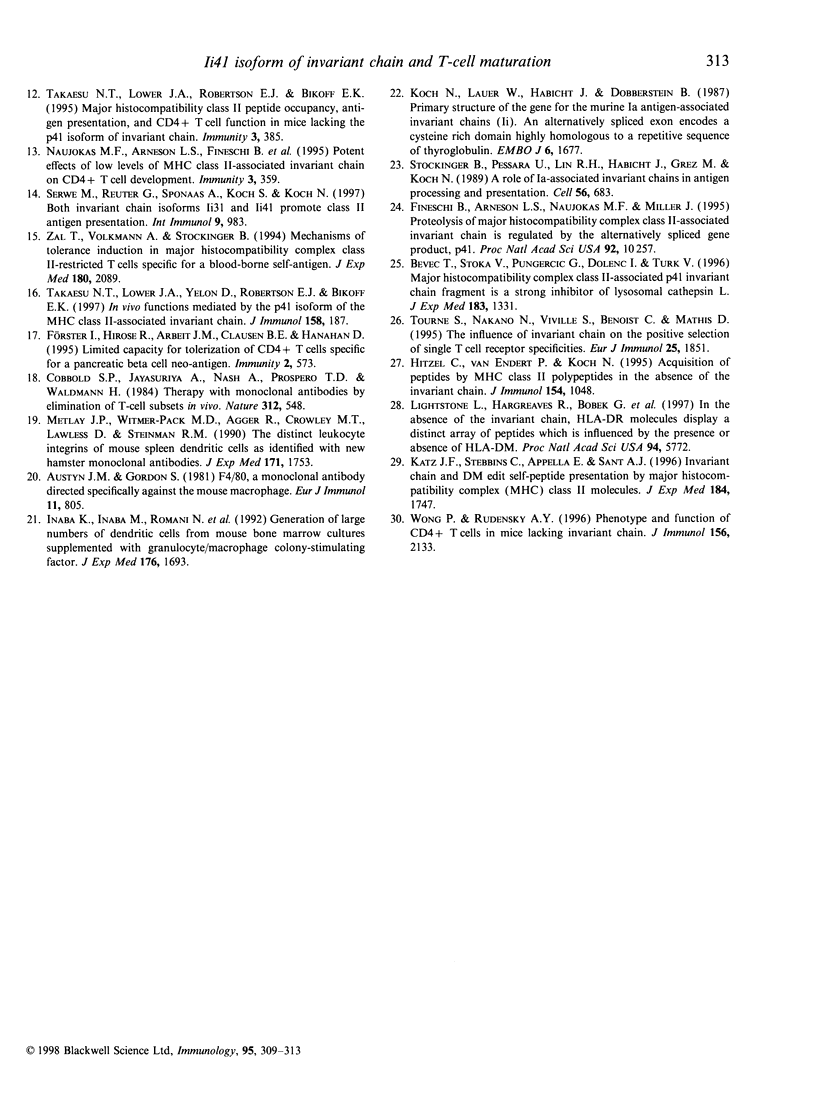
Selected References
These references are in PubMed. This may not be the complete list of references from this article.
- Anderson M. S., Miller J. Invariant chain can function as a chaperone protein for class II major histocompatibility complex molecules. Proc Natl Acad Sci U S A. 1992 Mar 15;89(6):2282–2286. doi: 10.1073/pnas.89.6.2282. [DOI] [PMC free article] [PubMed] [Google Scholar]
- Austyn J. M., Gordon S. F4/80, a monoclonal antibody directed specifically against the mouse macrophage. Eur J Immunol. 1981 Oct;11(10):805–815. doi: 10.1002/eji.1830111013. [DOI] [PubMed] [Google Scholar]
- Bakke O., Dobberstein B. MHC class II-associated invariant chain contains a sorting signal for endosomal compartments. Cell. 1990 Nov 16;63(4):707–716. doi: 10.1016/0092-8674(90)90137-4. [DOI] [PubMed] [Google Scholar]
- Bevec T., Stoka V., Pungercic G., Dolenc I., Turk V. Major histocompatibility complex class II-associated p41 invariant chain fragment is a strong inhibitor of lysosomal cathepsin L. J Exp Med. 1996 Apr 1;183(4):1331–1338. doi: 10.1084/jem.183.4.1331. [DOI] [PMC free article] [PubMed] [Google Scholar]
- Bikoff E. K., Huang L. Y., Episkopou V., van Meerwijk J., Germain R. N., Robertson E. J. Defective major histocompatibility complex class II assembly, transport, peptide acquisition, and CD4+ T cell selection in mice lacking invariant chain expression. J Exp Med. 1993 Jun 1;177(6):1699–1712. doi: 10.1084/jem.177.6.1699. [DOI] [PMC free article] [PubMed] [Google Scholar]
- Cobbold S. P., Jayasuriya A., Nash A., Prospero T. D., Waldmann H. Therapy with monoclonal antibodies by elimination of T-cell subsets in vivo. Nature. 1984 Dec 6;312(5994):548–551. doi: 10.1038/312548a0. [DOI] [PubMed] [Google Scholar]
- Elliott E. A., Drake J. R., Amigorena S., Elsemore J., Webster P., Mellman I., Flavell R. A. The invariant chain is required for intracellular transport and function of major histocompatibility complex class II molecules. J Exp Med. 1994 Feb 1;179(2):681–694. doi: 10.1084/jem.179.2.681. [DOI] [PMC free article] [PubMed] [Google Scholar]
- Fineschi B., Arneson L. S., Naujokas M. F., Miller J. Proteolysis of major histocompatibility complex class II-associated invariant chain is regulated by the alternatively spliced gene product, p41. Proc Natl Acad Sci U S A. 1995 Oct 24;92(22):10257–10261. doi: 10.1073/pnas.92.22.10257. [DOI] [PMC free article] [PubMed] [Google Scholar]
- Förster I., Hirose R., Arbeit J. M., Clausen B. E., Hanahan D. Limited capacity for tolerization of CD4+ T cells specific for a pancreatic beta cell neo-antigen. Immunity. 1995 Jun;2(6):573–585. doi: 10.1016/1074-7613(95)90002-0. [DOI] [PubMed] [Google Scholar]
- Hitzel C., van Endert P., Koch N. Acquisition of peptides by MHC class II polypeptides in the absence of the invariant chain. J Immunol. 1995 Feb 1;154(3):1048–1056. [PubMed] [Google Scholar]
- Inaba K., Inaba M., Romani N., Aya H., Deguchi M., Ikehara S., Muramatsu S., Steinman R. M. Generation of large numbers of dendritic cells from mouse bone marrow cultures supplemented with granulocyte/macrophage colony-stimulating factor. J Exp Med. 1992 Dec 1;176(6):1693–1702. doi: 10.1084/jem.176.6.1693. [DOI] [PMC free article] [PubMed] [Google Scholar]
- Katz J. F., Stebbins C., Appella E., Sant A. J. Invariant chain and DM edit self-peptide presentation by major histocompatibility complex (MHC) class II molecules. J Exp Med. 1996 Nov 1;184(5):1747–1753. doi: 10.1084/jem.184.5.1747. [DOI] [PMC free article] [PubMed] [Google Scholar]
- Koch N., Lauer W., Habicht J., Dobberstein B. Primary structure of the gene for the murine Ia antigen-associated invariant chains (Ii). An alternatively spliced exon encodes a cysteine-rich domain highly homologous to a repetitive sequence of thyroglobulin. EMBO J. 1987 Jun;6(6):1677–1683. doi: 10.1002/j.1460-2075.1987.tb02417.x. [DOI] [PMC free article] [PubMed] [Google Scholar]
- Lamb C. A., Yewdell J. W., Bennink J. R., Cresswell P. Invariant chain targets HLA class II molecules to acidic endosomes containing internalized influenza virus. Proc Natl Acad Sci U S A. 1991 Jul 15;88(14):5998–6002. doi: 10.1073/pnas.88.14.5998. [DOI] [PMC free article] [PubMed] [Google Scholar]
- Lightstone L., Hargreaves R., Bobek G., Peterson M., Aichinger G., Lombardi G., Lechler R. In the absence of the invariant chain, HLA-DR molecules display a distinct array of peptides which is influenced by the presence or absence of HLA-DM. Proc Natl Acad Sci U S A. 1997 May 27;94(11):5772–5777. doi: 10.1073/pnas.94.11.5772. [DOI] [PMC free article] [PubMed] [Google Scholar]
- Metlay J. P., Witmer-Pack M. D., Agger R., Crowley M. T., Lawless D., Steinman R. M. The distinct leukocyte integrins of mouse spleen dendritic cells as identified with new hamster monoclonal antibodies. J Exp Med. 1990 May 1;171(5):1753–1771. doi: 10.1084/jem.171.5.1753. [DOI] [PMC free article] [PubMed] [Google Scholar]
- Naujokas M. F., Arneson L. S., Fineschi B., Peterson M. E., Sitterding S., Hammond A. T., Reilly C., Lo D., Miller J. Potent effects of low levels of MHC class II-associated invariant chain on CD4+ T cell development. Immunity. 1995 Sep;3(3):359–372. doi: 10.1016/1074-7613(95)90120-5. [DOI] [PubMed] [Google Scholar]
- Peterson M., Miller J. Antigen presentation enhanced by the alternatively spliced invariant chain gene product p41. Nature. 1992 Jun 18;357(6379):596–598. doi: 10.1038/357596a0. [DOI] [PubMed] [Google Scholar]
- Roche P. A., Cresswell P. Invariant chain association with HLA-DR molecules inhibits immunogenic peptide binding. Nature. 1990 Jun 14;345(6276):615–618. doi: 10.1038/345615a0. [DOI] [PubMed] [Google Scholar]
- Serwe M., Reuter G., Sponaas A., Koch S., Koch N. Both invariant chain isoforms Ii31 and Ii41 promote class II antigen presentation. Int Immunol. 1997 Jul;9(7):983–991. doi: 10.1093/intimm/9.7.983. [DOI] [PubMed] [Google Scholar]
- Shachar I., Elliott E. A., Chasnoff B., Grewal I. S., Flavell R. A. Reconstitution of invariant chain function in transgenic mice in vivo by individual p31 and p41 isoforms. Immunity. 1995 Sep;3(3):373–383. doi: 10.1016/1074-7613(95)90121-3. [DOI] [PubMed] [Google Scholar]
- Stockinger B., Pessara U., Lin R. H., Habicht J., Grez M., Koch N. A role of Ia-associated invariant chains in antigen processing and presentation. Cell. 1989 Feb 24;56(4):683–689. doi: 10.1016/0092-8674(89)90590-4. [DOI] [PubMed] [Google Scholar]
- Takaesu N. T., Lower J. A., Robertson E. J., Bikoff E. K. Major histocompatibility class II peptide occupancy, antigen presentation, and CD4+ T cell function in mice lacking the p41 isoform of invariant chain. Immunity. 1995 Sep;3(3):385–396. doi: 10.1016/1074-7613(95)90122-1. [DOI] [PubMed] [Google Scholar]
- Takaesu N. T., Lower J. A., Yelon D., Robertson E. J., Bikoff E. K. In vivo functions mediated by the p41 isoform of the MHC class II-associated invariant chain. J Immunol. 1997 Jan 1;158(1):187–199. [PubMed] [Google Scholar]
- Teyton L., O'Sullivan D., Dickson P. W., Lotteau V., Sette A., Fink P., Peterson P. A. Invariant chain distinguishes between the exogenous and endogenous antigen presentation pathways. Nature. 1990 Nov 1;348(6296):39–44. doi: 10.1038/348039a0. [DOI] [PubMed] [Google Scholar]
- Tourne S., Nakano N., Viville S., Benoist C., Mathis D. The influence of invariant chain on the positive selection of single T cell receptor specificities. Eur J Immunol. 1995 Jul;25(7):1851–1856. doi: 10.1002/eji.1830250709. [DOI] [PubMed] [Google Scholar]
- Viville S., Neefjes J., Lotteau V., Dierich A., Lemeur M., Ploegh H., Benoist C., Mathis D. Mice lacking the MHC class II-associated invariant chain. Cell. 1993 Feb 26;72(4):635–648. doi: 10.1016/0092-8674(93)90081-z. [DOI] [PubMed] [Google Scholar]
- Wong P., Rudensky A. Y. Phenotype and function of CD4+ T cells in mice lacking invariant chain. J Immunol. 1996 Mar 15;156(6):2133–2142. [PubMed] [Google Scholar]
- Yamamoto K., Koch N., Steinmetz M., Hämmerling G. J. One gene encodes two distinct Ia-associated invariant chains. J Immunol. 1985 May;134(5):3461–3467. [PubMed] [Google Scholar]
- Zal T., Volkmann A., Stockinger B. Mechanisms of tolerance induction in major histocompatibility complex class II-restricted T cells specific for a blood-borne self-antigen. J Exp Med. 1994 Dec 1;180(6):2089–2099. doi: 10.1084/jem.180.6.2089. [DOI] [PMC free article] [PubMed] [Google Scholar]


